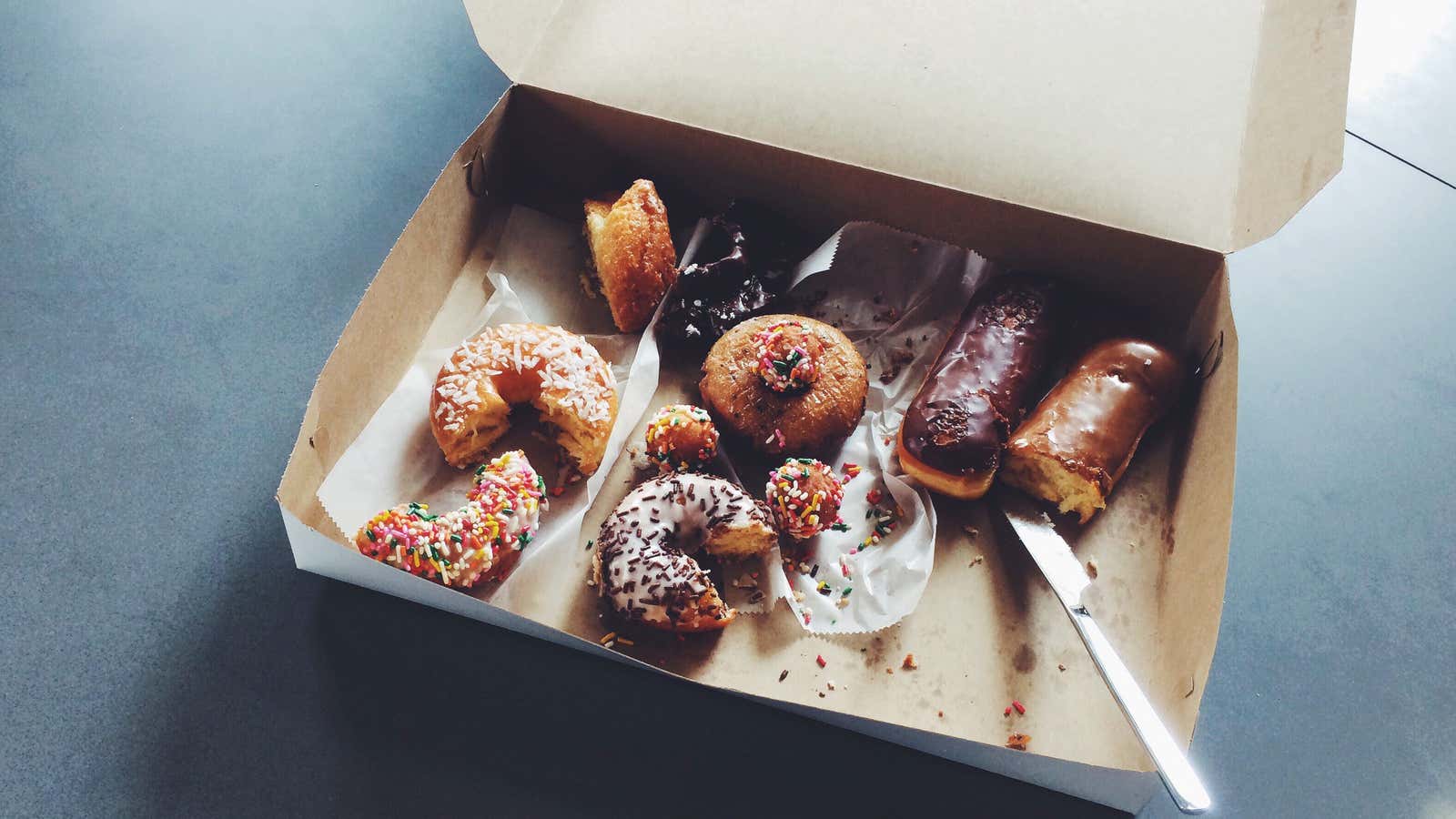The phrase “office cake culture” sounds like it was invented to make the eating of cake, donuts, and other pastries at work seem as current and new as bingeing on streaming shows. Sadly, it’s a tradition as old as offices themselves, only finally given a name, which also makes it easier to condemn.
Dental surgeons at the Royal College of Surgeons in the UK have recently taken an unequivocal stand against the eating of cake and cake-like sugary treats at the office, using the new year’s resolutions season to issue an official position statement on “Combatting cake culture.”
The dentists, who were predictably called out as “bastards,” are concerned about the UK’s rates of obesity and diabetes, but also the frequency with which people allow their tooth enamel to come under assault from sugar. They argue that the workplace is one of the main sites for sugar consumption, and although they don’t supply data to support this claim, anyone who works with other humans in a western country is aware that sweets in the break room are an occupational health hazard.
The problem with a sugar-heavy diet goes beyond tooth enamel and even rounding middles, however. Increasingly, science is showing that eating a lot of sugar is bad for your brain and memory. The reasons why are not well understood, but it’s possible that unhealthy foods raise blood sugar levels, or feed inflammation in the body, including within the brain.
As NPR reported, one study from Cambridge University, published last year in Neurobiology of Aging, showed that the brains of obese adults contain less white matter—neural tissue that’s important to learning, and through which different areas of the brain relay messages—than those of leaner people. In 2015, the Journal of Pediatrics published a study showing that obese children did not perform as well as non-obese children on memory tests.
A psychologist at the Center for Behavioral Neuroscience at American University told public radio that saturated fats and sugars appear to impair functioning in the hippocampus, the part of the brain associated with memory. They also seem to make people more likely to crave even more sugar and fat, so eating cake on a semi-regular basis—and it’s always somebody’s birthday—creates a vicious cycle.
Unfortunately, anyone who wants to resist office cake culture will face an extremely powerful foe: the social mind. Food psychologists argue that one big reason we eat foods like cake—at work, or anywhere—even though it’s irrational, is because we feel the pressure to be liked, especially by the people we see as our in-group, or those who are most like us.
A meta-analysis of food studies published in the Journal of the Academy of Nutrition and Dietetics in 2013 concluded that people tend to eat higher or lower calorie foods (pdf)—and higher or lower volumes of food—depending on information they’re given about what other people are eating.
Amazingly, we even synchronize our bites, the same way we subconsciously mirror someone else’s posture or body language, without ever realizing it. As Tegan Cruwys, a professor of psychology at University of Queensland in Australia, told Quartz last year, her meta-analysis of food studies, published by the journal Appetite in 2015, showed that this kind of modeling is not moderated by age, weight, or even hunger.
Social influence plays a bigger role in what we eat than people realize and will admit to, she explained. We think we know why we said yes to a slice of office cake because we can access our own mind and remember the rationalizations we made. We also like to believe we have willpower. In reality, according to Cruwys, “We are systematically and strategically attending to people who tell us something meaningful about who we are, even if we are not wholly conscious of the process.”
The question is, how can things change when cake has been synonymous with celebrations since antiquity? Anyone who has weighed the virtues of sharing fruit or veggies against the pleasure of passing out brownies or cupcakes knows that denying others sugar feels like a wet-blanket move, something the social mind can’t tolerate.
As a start, the British dentists, and others, have urged employers and managers to lead the way in reducing sugar consumption at the workplace by celebrating milestones with healthful foods and avoiding cookies and junk food as the snacks offered at meetings, for example.
Here, science is on their side: If anyone can influence our behavior around food, social psychology also suggests that the boss is probably the most likely candidate.
